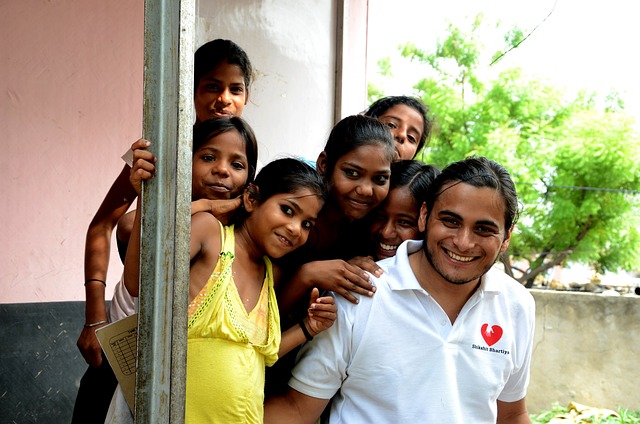Empathy is the ability to understand and share the feelings of others. It is a crucial skill that can help build stronger relationships, promote understanding, and foster kindness and compassion in ourselves and others. Developing empathy takes time and effort, but it is a worthwhile pursuit that can enrich our lives in countless ways. In this article, we’ll explore some strategies for developing empathy.
Active Listening

Active listening is a crucial skill that can enhance communication and deepen relationships. It involves giving your full attention to the person speaking, understanding their perspective, and responding in a way that demonstrates empathy and understanding. Practising active listening can help you to become a better communicator. It can also help you build stronger relationships, and foster greater trust and understanding in your personal and professional life.
Practising Active Listening
- Focus on the speaker: When someone is speaking to you, make a conscious effort to focus on them and their message. This means putting aside any distractions or competing thoughts and giving your full attention to the person speaking.
- Use nonverbal cues: Nodding your head or maintaining eye contact tells the speaker that you are listening and engaged. This can help to build trust and rapport between you and the speaker.
- Avoid interrupting: Interrupting the speaker can be perceived as dismissive or disrespectful. Try to let the speaker finish their thought before responding, and avoid interrupting or finishing their sentences for them.
- Ask clarifying questions: If you are unsure of what the speaker means, or if you need more information to fully understand their perspective, ask clarifying questions. This can demonstrate that you are actively listening and seeking to understand their message.
- Paraphrase what you’ve heard: After the speaker has finished speaking, paraphrase what you’ve heard in your own words. This demonstrates that you have understood their message. This can also help to clarify any misunderstandings and ensure that you are both on the same page.
- Validate the speaker’s feelings: If the speaker is sharing their emotions or feelings, validate their experience by acknowledging their feelings and expressing empathy. This can help to build trust and understanding, and demonstrate that you are listening and taking their message seriously.
- Be open-minded: Finally, to truly practise active listening, it’s important to approach the conversation with an open-minded attitude. Try to avoid preconceptions or assumptions, and be willing to consider new perspectives and ideas.
Summary
Active listening is a crucial skill that can enhance communication and deepen relationships. By focusing on the speaker, using nonverbal cues, and avoiding interrupting, you can become a better listener and communicator. It’s also important to ask clarifying questions, paraphrase what you’ve heard, validate the speaker’s feelings, and be open-minded. Practising active listening can help you to build stronger relationships, and foster greater trust and understanding. You will then achieve more effective communication in all areas of your life.
Putting Yourself in Other People’s Shoes

Putting yourself in other people’s shoes is a valuable skill. It can help you to understand their perspectives and empathise with their experiences. By doing so, you can build stronger relationships, enhance communication, and foster greater understanding and compassion.
Putting Yourself in Other People’s Shoes
- Listen actively: The first step in putting yourself in someone else’s shoes is to actively listen to them. Pay attention to their words and tone, and try to understand what they are feeling and why. Ask questions to clarify their perspective and show that you are engaged in the conversation.
- Imagine yourself in their situation: Try to imagine what it would be like to be in the other person’s situation. What challenges would you face? What emotions would you feel? By doing this, you can gain a deeper understanding of their perspective and empathise with their experiences.
- Consider their background and experiences: Everyone has a unique background and experiences that shape their perspective. Try to consider these factors when trying to understand someone else’s perspective. How might their culture, upbringing, or past experiences influence their feelings and beliefs?
- Practise active empathy: Active empathy involves expressing empathy through words or actions. This might include saying something like, “I can understand why you feel that way” or offering support or assistance. By actively expressing empathy, you can demonstrate that you understand and care about the other person’s feelings.
- Challenge your assumptions: Sometimes, we make assumptions about other people’s experiences or perspectives based on our own biases or limited understanding. To put yourself in someone else’s shoes, it’s important to challenge these assumptions and seek to understand their perspective more fully.
Summary
Putting yourself in other people’s shoes is a valuable skill that can help you to understand their perspectives, empathise with their experiences, and build stronger relationships. By actively listening, imagining yourself in their situation, considering their background and experiences, practising active empathy, and challenging your assumptions, you can become a more empathetic and understanding person.
Practising Mindfulness

Practising mindfulness is a powerful way to reduce stress, increase focus, and improve overall well-being. Mindfulness involves paying attention to the present moment, without judgement or distraction, and accepting your thoughts and feelings without trying to control or change them.
Strategies for Practising Mindfulness
- Start with the breath: One of the easiest ways to practise mindfulness is to focus on your breath. Take a few deep breaths and notice the sensation of the air entering and leaving your body. If your mind starts to wander, gently bring your attention back to your breath.
- Use your senses: Mindfulness is about being fully present in the moment, and one way to do this is to use your senses. Notice the sights, sounds, smells, tastes, and sensations around you, without judging or analysing them.
- Practice acceptance: Mindfulness involves accepting your thoughts and feelings without judgement or resistance. If you notice yourself feeling anxious, sad, or stressed, acknowledge these feelings and allow them to be present without trying to change them.
- Stay present: It’s easy to get caught up in thoughts about the past or future, but mindfulness is about staying focused on the present moment. When you find your mind wandering, gently bring your attention back to the present.
- Practise regularly: Like any skill, mindfulness takes practice to develop. Set aside a few minutes each day to practise mindfulness, and gradually increase the amount of time as you become more comfortable.
- Use guided meditations: Guided meditations can be a helpful tool for practising mindfulness, especially for beginners. There are many apps, websites, and podcasts that offer free guided meditations.
- Be patient: Mindfulness is not a quick fix, and it takes time and patience to see results. Be kind to yourself and don’t get discouraged if you find your mind wandering or if you don’t feel an immediate improvement in your well-being.
Summary
Practising mindfulness is a powerful way to reduce stress, increase focus, and improve overall well-being. By focusing on your breath, using your senses, practising acceptance, staying present, practising regularly, using guided meditations, and being patient, you can develop a deeper sense of awareness and compassion for yourself and others. Start small, be consistent, and enjoy the benefits that come with a regular mindfulness practice.
Reading Books

Reading books is an excellent way to develop empathy, as it allows you to experience the perspectives, thoughts, and emotions of characters who may be different from you. Through reading, you can learn about different cultures, experiences, and perspectives, and develop a deeper understanding of the human experience.
Reading Books to Develop Empathy
- Expands your worldview: Reading exposes you to different cultures, lifestyles, and experiences that you may not encounter in your own life. By exploring different perspectives and ways of life, you can broaden your understanding of the world and develop a greater appreciation for diversity.
- Encourages reflection: When you read a book, you often put yourself in the shoes of the characters and experience their thoughts and emotions. This encourages you to reflect on your own thoughts and feelings, and develop a greater sense of self-awareness.
- Builds emotional intelligence: Reading can help you to develop emotional intelligence by exposing you to a wide range of emotions and experiences. By empathising with the characters and understanding their motivations, you can develop a greater understanding of your own emotions and those of others.
- Enhances communication skills: Reading can also help to enhance your communication skills by exposing you to different styles of writing, dialogue, and language. This can help you to become a more effective communicator and better understand the perspectives of others.
- Fosters compassion: When you read about characters who experience challenges, struggles, and hardships, you can develop a greater sense of compassion for their experiences. This can translate into a greater sense of empathy for those in your own life who may be going through similar challenges.
Summary
Reading books is an excellent way to develop empathy. It can expose you to different perspectives, encourage reflection, build emotional intelligence, enhance communication skills, and foster compassion. Whether you’re reading fiction, non-fiction, or biographies, there is always something new to learn and discover. So, pick up a book and start exploring the world from different perspectives. You’ll be amazed how it much it will enrich your life in unexpected ways.
Volunteering

Volunteering is a powerful way to develop empathy. It allows you to connect with people and communities in need, and to understand their challenges and experiences. Through volunteering, you can develop a greater sense of compassion, understanding, and social responsibility.
Ways Volunteering Helps to Develop Empathy
- Creates personal connections: Volunteering often involves working directly with people and communities in need. This allows you to create personal connections and to understand the challenges and experiences of those you are helping.
- Provides a new perspective: When you volunteer, you expose yourself to new environments, cultures, and experiences that may be different from your own. This can provide you with a new perspective and a greater appreciation for diversity.
- Builds relationships: Through volunteering, you can build relationships with people from all walks of life. This can help you to develop a deeper understanding of different cultures, backgrounds, and experiences.
- Encourages self-reflection: Volunteering can encourage self-reflection by exposing you to your own biases and assumptions. By working with people from different backgrounds and experiences, you can gain a greater understanding of your own perspective and how it may differ from others.
- Develops social responsibility: Volunteering can help to develop a sense of social responsibility by encouraging you to take action to make a positive difference in the world. This can help you to become more engaged in your community and to develop a greater sense of purpose.
Summary
Volunteering is an excellent way to develop empathy by creating personal connections, providing a new perspective, and building relationships. It also encourages self-reflection, and develops social responsibility. Whether you volunteer at a local non-profit, a community organisation, or a global initiative, there are always opportunities to make a positive impact in the lives of others. So, consider volunteering your time and skills to help those in need. You may well find that it enriches your life in unexpected ways.
Open-Mindedness

Open-mindedness is an essential component of developing empathy. It involves the willingness to consider different perspectives and to understand the experiences and viewpoints of others. By being open-minded, we can develop a greater sense of compassion, understanding, and respect for those who may have different backgrounds, beliefs, and experiences than our own.
Open-Mindedness
- Encourages curiosity: When we are open-minded, we are curious about the world and the people around us. This curiosity can lead us to explore different cultures, beliefs, and experiences. It may also help us to develop a greater understanding of the diversity of the human experience.
- Increases tolerance: Open-mindedness can help to increase our tolerance for differences. By understanding that there are many ways to approach a situation, we can learn to appreciate and respect the different viewpoints of others.
- Promotes self-awareness: Open-mindedness requires us to be self-aware and to examine our own beliefs and assumptions. This can help us to recognize and overcome biases that may prevent us from understanding the experiences of others.
- Encourages empathy: When we are open-minded, we are more likely to empathise with others. By understanding their experiences and perspectives, we can develop a greater sense of compassion and connection.
- Helps to bridge differences: Open-mindedness can help to bridge differences between people and communities. By understanding and respecting the viewpoints of others, we can work together to find common ground and to create a more inclusive and tolerant society.
Summary
Open-mindedness is a critical component of developing empathy. It can help us to be more curious, tolerant, self-aware, empathetic, and bridge differences between people and communities. By cultivating an open-minded attitude, we can develop a greater appreciation for the diversity of the human experience and create a more compassionate and connected world. So, let’s embrace open-mindedness and work towards a more empathetic and inclusive society.
Wrapping It All Up
In conclusion, developing empathy is a worthwhile pursuit that can enrich our lives in countless ways. By practising active listening, putting yourself in the other person’s shoes, and practising mindfulness, you can develop greater empathy and understanding towards others. Reading books, watching films, volunteering, and open-mindedness also works wonders. This, in turn, can help to build stronger relationships, promote understanding, and foster kindness and compassion in ourselves and others.
Read More
- Testolan Supplement – Male Testosterone Management
- The Role of Genetics in Obesity: Myths and Realities
- How Maintaining a Healthy Mindset Improves Your Life
- 3 Surprising Sources of Protein, Fibre, and Essential Vitamins
- Nutritional Needs of Teenagers: A Comprehensive Guide
Disclaimer: The information provided on Healthy Lifestyles for All is intended for general educational purposes only and should not be considered as medical advice. Please consult with your GP or other health professional before making any significant changes to your diet, exercise routine, or any other aspect of your lifestyle. We are not responsible for any adverse effects or consequences resulting from the use of the information provided on our blog.
Comments: I hope you enjoyed reading this post as much as I enjoyed writing it. If you liked it, please leave a comment. If you didn’t like it, disagree with something I have written (I’m okay with that), or think I got something wrong (that’s okay too), please leave a comment as well. We only truly learn from our mistakes, so I am happy to have mine pointed out.
Affiliate Links: Please also note that I may make a small amount of money if you buy one of the products I recommend in any of my blog posts. Rest assured that I have done my own due diligence, and only recommend products that have been tried and tested, and have extremely good feedback. Additionally, many of the products I recommend have 30 or 60-day money-back guarantees, so you can buy in the confidence that if a particular product is not right for you, you can get a refund.

